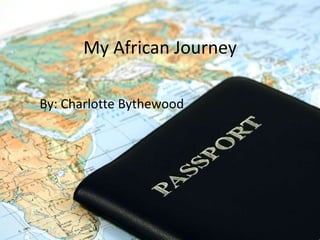
My african journey
- 1. My African Journey By: Charlotte Bythewood
- 2. Look Out Africa Here I Come I ripped this out of a textbook I found When the plane landed in Egypt, I could tell it was a lot different from the U.S. Most of the Egyptians are Muslim (about 90%) and only 10% Christian! Cairo is the capital city of Egypt and is located on the eastern bank of the river Nile. It is also the largest city in Africa! In Arabic, it is known as Al-Qahirah, or the victorious. Farther up north, I am staying with Sucaryiqu, a friend.
- 3. Day 1 This is one of the tombs! When morning came, I was ready to see the “tombs”. Egyptians are known to believe in after life, that is the reason why they beautifully arrange the tombs, puts ornamentals( beautiful things), and other things that they need in the after life. For rich Egyptians and Pharaohs, their bodies are wrapped in linen and are placed in their tombs. Tombs are placed inside caves or pyramids where the walls are fully decorated with frescos (paintings).
- 4. Day 1- continued Deserts are nearby, and the climate is naturally affected - dry, hot days, with cooler nights and scant rainfall. Egypt doesn’t always look so pretty. While I have been here I can see the desert swallow Egypt, since it is in the Sahara desert. Desertification is growing rapidly and rain is decreasing. On the top picture, the people I am staying with are working on there field. This year, like many, they will not make enough money to support themselves for the year.
- 5. Day 2 Abuja, Nigeria • The capital of Nigeria Now, I am getting on a plane heading to Abuja, the capital of Nigeria in Western Africa. Abuja was built in the 1980’s and the official language is English. This should make my stay easier! I was so eager to shop for souvenirs I just had to stop at the market. There were so many things for sale – wooden carvings, leather bags, jewelry, and so much more. But where were the prices? There aren’t any like in the US, you have to negotiate the prices with the seller. A true market economy! I picked up an animal carving and paid with Nigerian Naira.
- 6. Day 2- continued in Nigeria • Akinlana working on a carving for tourists. After I got my carving, I talked to the man named Akinlana who made me the carving. I found out that this was his way of making a living. Did you know that 45% of Africans live in extreme poverty? “ The government is corrupt and doesn’t care about us” he said. “But there is some hope. The government started a program called NEEDS that has helped Nigerians get a basic education and that helps protect the environment. But infants and mothers are still dying during child birth, people are hunger and we have problems with disease like HIV/AIDS and malaria.” Akinlana said sadly. As I left the market, I felt bad for the sad souls staring at me. I headed back to my motel with a heavy heart.
- 7. Day 3 Another thing I learned during my stay in Nigeria was how much their mixed- economy depends on the export of fossil fuels like natural gas and oil. It is strange how a country can have so much wealth in natural resources but so much poverty at the same time. Economists refer to this as the “resource curse". Nigeria is trying hard to manufacture more things to export to Western African countries as well as produce more of its own food to help feed the people.
- 8. Day 4 The Anthropology Museum It has been great in Nigeria, but now I’m flying to Democratic Republic Of Congo. Up, up, and away. I am in the Democratic republic of Congo. When I was walking up the streets my eye caught the sight of the Anthropology Museum. It was so big and beautiful I had to go in. When I got inside a tour guide named Amba greeted me. She told me about the history of Congo. “ There was an estimated 10 million people who are had died from forced labor, starvation, and outright extermination during Leopold's colonial rule.” She told me about how Belgium had been a part of this system as well. Plus, the independence that didn’t come far after.
- 9. Day 4- continued 4:00- I am now on a tour “boat” heading down the fifth longest river in the world. None other than the Congo River. As we headed steadily down the river, I learned that there were bantu speaking people that had lived along the coast of Congo for more than 2,000 years! Wow, the water was getting so fast and bumpy I decided to name it “Gates of Hell”. Turns out I wasn’t the only one thinking so. The rivers go very fast for 75-miles straight.
- 10. Day 5 Africa is very different in many different countries. From economics, to culture, to government and more. I am going back to the airport to leave my exiting journey and head back to the United States. “ Air flit to Georgia now boarding”. That’s my fight. Up, up, and away!
